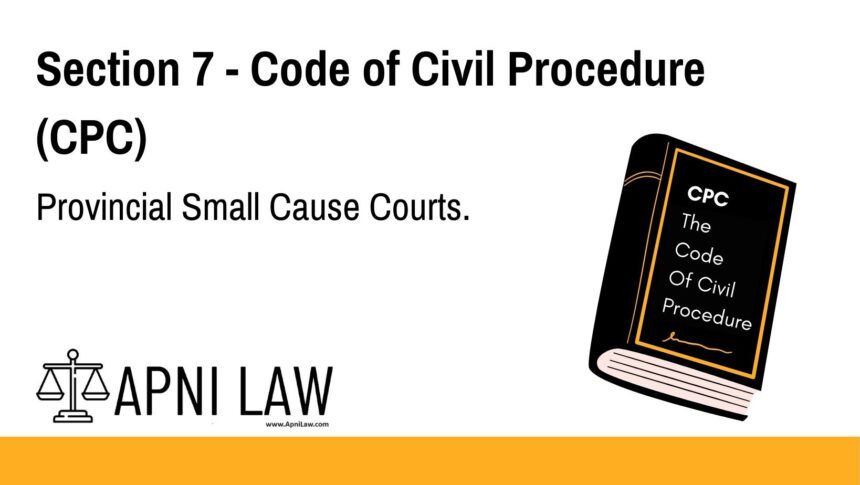Code
The following provisions shall not extend to Courts constituted under the Provincial Small Cause Courts Act, 1887 (9 of 1887), or under the Berar Small Cause Courts Law, 1905, or to Courts exercising the jurisdiction of a Court of Small Causes under the said Act or Law, or to Courts in any part of India to which the said Act does not extend but which exercise a corresponding jurisdiction, that is to say—
(a) so much of the body of the Code as relates to—
(i) suits excepted from the cognizance of a Court of Small Causes;
(ii) the execution of decrees in such suits;
(iii) the execution of decrees against immovable property; and
(b) the following sections, that is to say—
section 9,
sections 91 and 92,
sections 94 and 95, so far as they authorize or relate to—
(i) orders for the attachment of immovable property,
(ii) injunctions,
(iii) the appointment of a receiver of immovable property, or
(iv) interlocutory orders referred to in clause (e) of section 94,
and sections 96 to 112 and 115.
Explanation of Section 7 CPC
Section 7 lays down the exclusions applicable to Courts established under the Provincial Small Cause Courts Act, 1887 or exercising similar jurisdiction.
These courts are specifically designed to quickly resolve small monetary claims and not be burdened by complex legal proceedings.
Therefore, the Code excludes:
- Suits outside the scope of Small Cause Courts (such as those involving immovable property)
- Execution of decrees in those suits
- Execution against immovable property
- Specific sections dealing with appeals, revisions, injunctions, receivership, and certain supplemental proceedings
Purpose: These exclusions maintain the summary and efficient nature of Small Cause Court proceedings.
Key Takeaways
- Small Cause Courts cannot handle suits related to property, trusts, or public nuisances.
- Sections involving appeals (96–112), revisions (115), and supplemental powers (94–95) are excluded.
- Only suits allowed under the Provincial Small Cause Courts Act are cognizable.
Illustration
Suppose Mr. A files a suit against Mr. B for unpaid rent of ₹5,000 in a Small Cause Court.
This suit is maintainable because:
- It is a small-value monetary dispute.
- No complex legal relief like injunctions or appointment of receivers is involved.
However, if Mr. A also seeks:
- An injunction restraining Mr. B from subletting,
- Attachment of Mr. B’s immovable property, or
- Appointment of a receiver for the rented property,
Then the Small Cause Court cannot entertain these requests because:
- Such reliefs are covered under Sections 94 and 95 CPC, which are excluded under Section 7 CPC.
Common Questions Asked in Exams and Interviews
Q1. What is the purpose of Section 7 CPC?
It excludes certain provisions of the CPC from applying to Small Cause Courts to keep their procedure summary and efficient.
Q2. Which provisions of the CPC do not apply to Small Cause Courts?
Sections 9, 91, 92, 94, 95 (partially), and Sections 96–112, 115, along with all provisions related to:
- Suits not cognizable by Small Cause Courts
- Execution of decrees in such suits
- Execution of decrees against immovable property
Q3. Can appeals be filed from Small Cause Court judgments?
No. Appeals under Section 96 are specifically excluded by Section 7 CPC.
Q4. Can a Small Cause Court issue an injunction?
No. The power to grant injunctions under Section 94 CPC is excluded under Section 7 CPC.
Q5. What kind of suits are heard in Small Cause Courts?
Primarily suits involving recovery of money like unpaid rent, loans, and bills that are within the prescribed monetary limit.
Conclusion
Section 7 CPC plays a key role in streamlining the jurisdiction of Small Cause Courts. By removing the applicability of complex legal procedures, appeals, and property-related remedies, the provision ensures that Small Cause Courts remain fast and efficient in resolving minor civil disputes. It preserves the essence of summary trial and is crucial for law students, paralegals, and legal professionals to understand.








